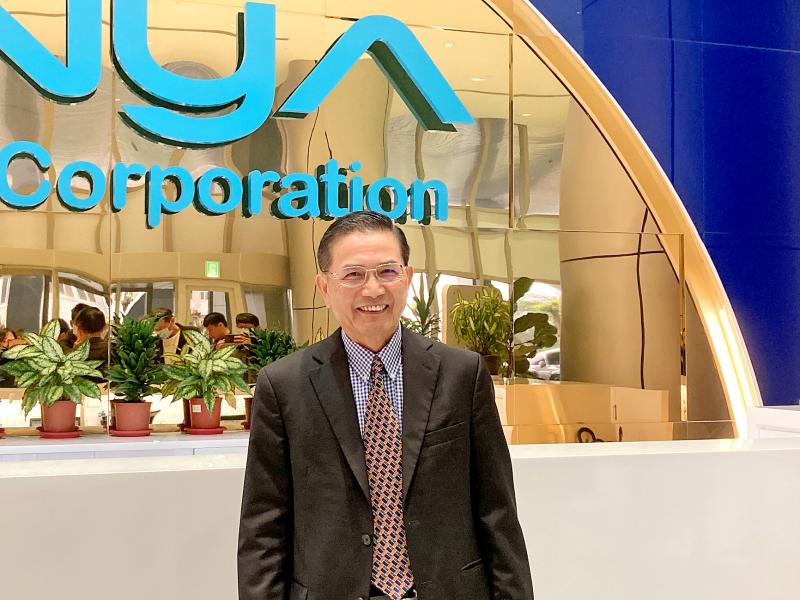Nanya Technology Corp (南亞科技) yesterday said net profit last quarter declined 14.3 percent from the previous quarter, but added that it has seen positive signs that the industry could rebound next quarter.
The nation’s biggest DRAM chipmaker had previously said that the most recent correction in the industry would last for about two quarters, and would be much shorter and milder than the previous downcycles, as the number of suppliers had fallen substantially.
“We are seeing an uptrend in the spot prices [for standard DRAM] in the first quarter. The price declines in contract-based prices are slowing down significantly from the fourth quarter,” Nanya Technology president Lee Pei-ing (李培瑛) told an online media briefing.

Photo: Lisa Wang, Taipei Times
The company expects average selling prices for DRAM chips to decline by a low-single-digit percentage this quarter from last quarter, and said they might rise again next quarter.
Overall, the company is optimistic about market demand this year, Lee said.
Demand for cloud-based servers is the strongest, while demand for smartphones, PCs and consumer electronics remain healthy this year, he said.
Component shortages, which restrain electronics shipments, would alleviate in the second half of this year, Lee said.
However, the company is wary of inflationary pressures and geopolitical tensions, which could dampen demand growth.
To speed up migration to next-generation technologies, Nanya Technology plans to boost its capital spending this year to NT$28 billion (US$1 billion) mostly to develop a new generation of “10-nanometer-class” memory chips, compared with NT$11.3 billion spent last year.
The 10-nanometer class indicates chips are made using process technologies of between 10 nanometers and 20 nanometers.
The company plans to ramp up production of its first-generation “10-nanometer-class” chips this year and the second generation probably next year, Lee said.
The company’s output is expected to change little this year, lagging behind the memory industry’s demand growth of 15 to 20 percent.
“That is a challenge for us. We have to quicken our pace in developing our own research and development capabilities to support growth,” Lee said.
Nanya Technology plans to start building a new 12-inch fab in the first half of this year, two quarters behind schedule, due to the bureaucratic hurdles.
The company reported that net profit last quarter fell to NT$6.45 billion, from NT$7.53 billion in the previous quarter, with earnings per share (EPS) of NT$2.08, down from NT$2.44 a quarter earlier.
A year earlier, it posted net profit of NT$924 million, or EPS of NT$0.3.
For the whole of last year, net profit soared to NT$22.85 billion, from NT$7.69 billion in 2020, while EPS jumped to NT$7.4 from NT$2.51.
Separately, Macronix International Co (旺宏電子), the world’s biggest NOR flash supplier, on Tuesday said net profit last quarter grew 219 percent year-on-year to NT$3.69 billion.
Macronix president C. Y. Lu (盧志遠) said that this year would be another good year for the NOR chip industry.
“Demand will continue outpacing supply this year, as no new factories are ramping up production,” Lu said. “We do not see any dark clouds this year.”
As Macronix continues to improve its product portfolios via broadening contributions from high-margin chips, it expects gross margin to climb further this quarter, after hitting 47.2 percent last quarter, which was up from 32.4 percent a year earlier.
Net profit for last year more than doubled to NT$11.96 billion, from NT$5.33 billion in 2020, marking the best result in 26 years, it said.

Intel Corp chief executive officer Lip-Bu Tan (陳立武) is expected to meet with Taiwanese suppliers next month in conjunction with the opening of the Computex Taipei trade show, supply chain sources said on Monday. The visit, the first for Tan to Taiwan since assuming his new post last month, would be aimed at enhancing Intel’s ties with suppliers in Taiwan as he attempts to help turn around the struggling US chipmaker, the sources said. Tan is to hold a banquet to celebrate Intel’s 40-year presence in Taiwan before Computex opens on May 20 and invite dozens of Taiwanese suppliers to exchange views

Application-specific integrated circuit designer Faraday Technology Corp (智原) yesterday said that although revenue this quarter would decline 30 percent from last quarter, it retained its full-year forecast of revenue growth of 100 percent. The company attributed the quarterly drop to a slowdown in customers’ production of chips using Faraday’s advanced packaging technology. The company is still confident about its revenue growth this year, given its strong “design-win” — or the projects it won to help customers design their chips, Faraday president Steve Wang (王國雍) told an online earnings conference. “The design-win this year is better than we expected. We believe we will win

Chizuko Kimura has become the first female sushi chef in the world to win a Michelin star, fulfilling a promise she made to her dying husband to continue his legacy. The 54-year-old Japanese chef regained the Michelin star her late husband, Shunei Kimura, won three years ago for their Sushi Shunei restaurant in Paris. For Shunei Kimura, the star was a dream come true. However, the joy was short-lived. He died from cancer just three months later in June 2022. He was 65. The following year, the restaurant in the heart of Montmartre lost its star rating. Chizuko Kimura insisted that the new star is still down

While China’s leaders use their economic and political might to fight US President Donald Trump’s trade war “to the end,” its army of social media soldiers are embarking on a more humorous campaign online. Trump’s tariff blitz has seen Washington and Beijing impose eye-watering duties on imports from the other, fanning a standoff between the economic superpowers that has sparked global recession fears and sent markets into a tailspin. Trump says his policy is a response to years of being “ripped off” by other countries and aims to bring manufacturing to the US, forcing companies to employ US workers. However, China’s online warriors